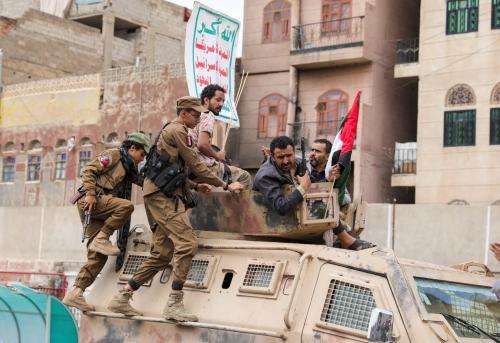Review of American Islam: The Struggle for the Soul of a Religion, by Paul M. Barrett.
Reza-
I agree with you: America’s openness to foreigners and the high respect the society accords to hardworking immigrants has made Muslim integration a success story here. Look across the ocean at Europe, and we have reason to be pleased. We shouldn’t be complacent, though; there is plenty of room for things to go wrong.
The story you tell about the Jerry Klein incident points to one of the biggest dangers to the sense of security of the Muslim community, and there’s no question that there are other signs of anti-Islamic sentiment out there. Paul Barrett discusses some of these in his last chapter—for example, the remarks of Gen. Jerry Boykin, who told a church group that he was sure America would prevail in the struggle against Bin Laden because “my God was bigger than his.” The greatest source of this animus comes from conservative evangelical Christians who have a Manichaean worldview and have filled the hole left by the demise of the Soviet Union with Islam. The remarks of Franklin Graham (Islam is “wicked”), former Watergate conspirator Chuck Colson (Islam “breeds hatred”), and Jerry Vines, former head of the Southern Baptist Convention (Mohammed was “a demon-obsessed pedophile”) are only the most prominent examples. Read some of the sermons and articles on church Web sites if you want more.
Needless to say, this hasn’t helped Muslims feel at home, nor have the kind of poll results you cite, such as the 2004 one that showed half of respondents thought Muslims’ civil rights should be curtailed. I’ve heard a number of Muslims say that their biggest worry is that there will be another attack and precisely that abrogation of their rights will occur. That provides some motivation for community self-policing, but instilling fear is not a sustainable counterterrorism strategy.
One of the oddities of the situation is that this is happening, as you rightly point out, against a backdrop of Muslim appreciation for the fact that religion can play a role in public life. But with polls showing that Americans want religion to play a larger role in their politics, we face the irony that Muslims are being unsettled by the determination of other Americans that their faith inform policy. At least during the current administration, the influence of evangelicals, a good portion of whom favored the invasion of Iraq as part of a fight against evil, has been at an unprecedented peak. We shouldn’t kid ourselves: American foreign policy over the last five years has alienated more than a few Muslims, as academic observers and journalists, Barrett included, have noted.
Perhaps as American Muslims become politically organized and vocal, they will develop the kind of aversion to mixing politics and religion expressed by most American Jews. I agree, though, that secularism—which carries an implication that people should compartmentalize and even abandon their faith—isn’t the answer. One of the problems Western Europe is having in dealing with its Muslim minorities is that secularism causes plenty of friction and antipathy; think of the controversy over Muslim women who wear the veil.
As for your question about why the U.S. government can’t take greater advantage of the American Muslim community in the “struggle for hearts and minds,” well, the problem cuts many ways. At first, Washington did try—ineptly. Charlotte Beers, the hapless Madison Avenue exec who was the first undersecretary of state for public diplomacy, put together a series of video spots showing how great life was for Muslims in the United States. Some countries refused to run them because the women were, by their standards, immodestly dressed. Others, showing Muslim women in robes and veils, were denounced by Muslim liberals as showing the subjugation of women. And in many countries, the response was: “We’re thrilled these people like living in Dearborn. Now please get the Israelis out of the West Bank and Gaza.”
Muslims abroad tend to be less interested in how their co-religionists live in the United States—what matters is American foreign policy. So, while the development of the American Islam that you describe may have a long-term effect on the broader faith, it probably will not undercut the appeal of jihadism abroad. What I meant when I wrote that American Muslims are “the first line of defense” was that they will prevent jihadist ideology from gaining much of a foothold here and keep an eye out for anyone who might be involved in violence, which would ultimately threaten the community.
I think that continues to be the case, although the patriotic ardor that some American Muslims expressed after 9/11 appears to have subsided pretty quickly as Afghanistan segued into Iraq, and the Bush administration declined to push any kind of negotiation process between Israel and the Palestinians. The government certainly didn’t help itself by detaining hundreds under the material witness and prosecuting a series of dubious cases, like the al-Hussayen one in Idaho. (The actual number of terrorism convictions in the United States is paltry.)
Meanwhile, the FBI and other government agencies have done a poor job of bringing enough Muslims on board because they can’t or won’t get them the necessary security clearances. Barrett’s story about Imad Hamad, a Michigan social worker of Palestinian ancestry who was nearly—and unfairly—almost deported in the 1990s, tells of another kind of bungled opportunity to strengthen ties to the Muslim community. In 2003, Hamad was slated to receive a special award from the FBI for encouraging Muslims to cooperate with the bureau after 9/11. It was rescinded when a right-wing Jewish organization aired 20-year-old allegations of connections with a radical group.
Hamad took this slight with remarkable grace. Others might have reacted differently.
Now, before signing off, I want to come back to the issue of an Islamic reformation, one with which you’ve become identified. You noted approvingly that there is now something we could call American Islam, emphasizing what we might call its liberalizing tendency. What I wonder about is whether this will ultimately be the germ of the expected reformation. We don’t have too many models for reformations to choose from, but the Protestant Reformation began as a movement of purification, not liberalization. That came much later.
I’ve often wondered if Bin Laden and his followers, with their grim determination to eliminate all “innovation” in the faith, aren’t akin to some of the wild Protestants of the first half of the 16th century. With their Salafi emphasis on the direct experience of scripture and the believer’s ability to understand the text, they remind me of Luther’s notion of “every man a priest.” One could even ask whether Bin Laden himself isn’t something of a Martin Luther figure, though the head of al-Qaida has none of Luther’s skill at theology.
(I once remarked this to a well-known Saudi prince, who instantly replied, “No, he is our Savonarola.” That remark floored me and suggested my interlocutor had been thinking about the subject.)
The Protestant Reformation took almost 150 years and, particularly during the Thirty Years’ War, claimed an enormous number of lives. I’d like to believe that in our fast-moving age we can skip ahead to the liberalizing phase of a reformation in Islam. But religions don’t change easily or quickly, and sometimes they have to take the longest route between two points. Can you give me reason for optimism?
Bests,
Dan
Part three of a four part book review conducted by Daniel Benjamin and Reza Aslan.
See also, parts one through four:
1. Will Islamic Radicalism Gain a Foothold in America?
2. Assimilation and the Creation of a Uniquely American Faith
3. Is Osama Bin Laden the Martin Luther of Islam?
4. Optimism in the Face of a “Cosmic War”



Commentary
Is Osama Bin Laden the Martin Luther of Islam?
January 24, 2007